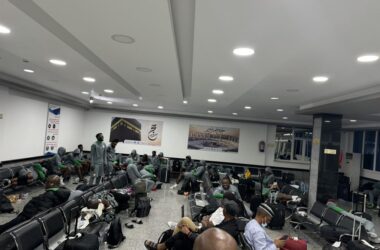President Donald Trump’s sweeping new tariffs on key trading partners, including Nigeria, Kenya, and Ghana, have sent shockwaves through global markets—raising fears of a destabilizing trade war that could disproportionately harm low-income, commodity-dependent economies.
A recent New York Times reports that economists warn the most vulnerable nations in this escalating conflict are those with limited leverage to retaliate—particularly African exporters already grappling with economic fragility. Nigeria, facing a 14% tariff, alongside Kenya and Ghana at 10%, now confronts heightened uncertainty as their key exports to the U.S. risk becoming less competitive.
Trump framed his aggressive tariff policy as a “liberation day” for American industry, echoing the rhetoric of Brexit proponents who saw Britain’s exit from the European Union as an act of economic self-determination. Yet, much like Brexit, this move risks triggering years of turbulence rather than immediate prosperity.
“The shock of Mr. Trump’s move is reverberating even more widely, given the larger size of the American economy and its place at the fulcrum of global commerce,” notes The New York Times. However, just as Brexit negotiations plunged the UK into prolonged uncertainty, economists fear Trump’s tariffs could unleash similar chaos in global trade networks.
For Nigeria—Africa’s largest economy—the new tariffs compound existing challenges. The country relies heavily on oil exports, but with additional trade barriers, its non-oil sectors, such as agriculture and manufacturing, could suffer. Kenya and Ghana, both hit with 10% tariffs, face pressure on key exports like textiles and cocoa.
“These nations have little room to maneuver,” said one African trade analyst. “Unlike China or the EU, they can’t impose retaliatory tariffs without hurting their own economies.” The result may be a painful squeeze on growth, exacerbating unemployment and debt burdens.
Despite Trump’s protectionist stance, some economists believe globalization may prove resilient. “The rise of free trade may be irreversible,” The New York Times suggests, pointing to the EU’s endurance post-Brexit. However, the immediate aftermath could be messy.
Eswar S. Prasad, a trade policy professor at Cornell, warns: “It will not be the end of free trade, but it is certainly a retreat from unfettered free trade… The reality is, it’s going to be every country for itself.”
For Nigeria and other African nations, that reality means navigating a fractured trade landscape—one where the U.S., once a stable market, has become an unpredictable partner. As the world watches for Trump’s next move, the question remains: Will global trade adapt, or will the poorest economies pay the highest price?










